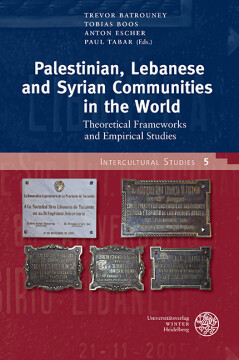
BUCH
Palestinian, Lebanese and Syrian Communities in the World
Theoretical Frameworks and Empirical Studies
Herausgeber: Batrouney, Trevor | Boos, Tobias | Escher, Anton | Tabar, Paul
Intercultural Studies, Bd. 5
2015
Zusätzliche Informationen
Bibliografische Daten
Abstract
The existing global connectedness of migrants and their descendants from contemporary Lebanon, Syria, and ancient Palestine is the outcome of the migration history of this region, which commenced in the middle of the 19th century. Today people from this region are as well part of different societies all over the world as well as part of global communities. The contributions of this volume discuss the experiences of “living-between-cultures” that these people do in times of globalization from an interdisciplinary perspective; namely from geography, history, political science, social anthropology, and sociology. Scholars from Australia, Austria, Brazil, France, Germany, Great Britain, Jordan, Lebanon, Mexico, and the United States of America present their empirical findings and examine theoretical key concepts and notions like diaspora, transnationalism, communitas, habitus, social network, and new media.
Inhaltsverzeichnis
| Zwischenüberschrift | Seite | Aktion | Preis |
|---|---|---|---|
| Contents | 5 | ||
| Introduction: Palestinian, Lebanese and Syrian Communities in the World. Trevor Batrouney, Tobias Boos, Anton Escher and Paul Tabar | 7 | ||
| Ethnicity and Identity: Community building in conditions of migration | 13 | ||
| Learning to be Lebanese: Fashioning an Ethnicised Habitus in Multicultural Australia. Greg Noble and Paul Tabar | 15 | ||
| The Community and its Fragments. Ethnicity, Nationalism and the Constitution of the Syrian-Lebanese Identity in Rio de Janeiro, Brazil. Paulo G. Pinto | 27 | ||
| ‘But what are ya?’ Identity, Belonging and In-between-ness in early Lebanese Australian Communities. Anne Monsour | 41 | ||
| Othering ‘Lebs’. Racialised Demonisation of Lebanese immigrants in Australia. Scott Poynting | 57 | ||
| Societies and Family: Institutional and family networks | 69 | ||
| Australian-Lebanese Community Organisations in a Modern Globalised World. Trevor Batrouney | 71 | ||
| At Home with Skype. New Media technologies, connectivity and social change between Lebanon and the Diaspora. Nelia Hyndman-Rizk | 87 | ||
| Profit, Privilege, and the Promise of Mexico: The Making of Carlos Slim Helú and Family. Theresa Alfaro-Velcamp | 101 | ||
| Moving Mashreqis. Empire and the Politics of Notables. Camila Pastor de Maria y Campos | 117 | ||
| Politics and religion: Communities and identities in motion | 135 | ||
| Nationalism, Diasporisation and Identity Transition. The Palestinian Case. Jalal Al Husseini and Aude Signole | 137 | ||
| Syro-Lebanese Influence on the Guajira Peninsula. Unexpected Historical Continuities from Economic Dominance to Hezbollah Venezuela? Philipp Bruckmayr | 153 | ||
| Lebanese Muslim Families in São Paulo. Patriarchal Practices and Old Dilemmas. Oswaldo Truzzi | 175 | ||
| Markers of Identity. Local Sanctuaries and Ethno-religious Boundaries in the present-day Syrian Arab Republic. Gebhard Fartacek | 191 | ||
| Concluding Thoughts and Prospects of Doing Research on Diaspora | 215 |


 Publishing Platform by CloudPublish
Publishing Platform by CloudPublish